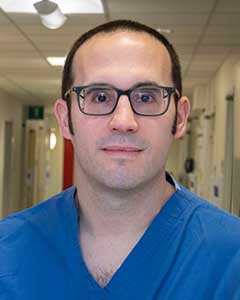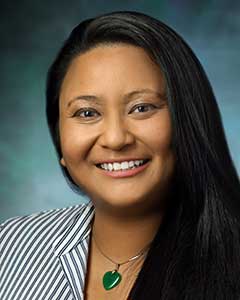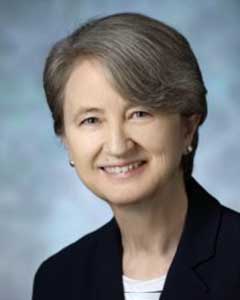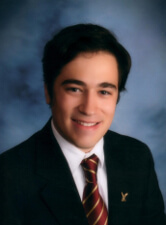The team at the Johns Hopkins Precision Medicine Center of Excellence for COVID-19 is working to improve the care of patients infected with SARS-CoV-2 by studying COVID-19 pathobiology, likelihood of disease progression and impact of specific therapeutic interventions.
The Johns Hopkins biocontainment unit (BCU) is a state-of-the art facility designed to care for adult and pediatric patients affected by high-consequence infectious diseases such as COVID-19, Ebola, smallpox, SARS, viral hemorrhagic fevers and other emerging special pathogens. The unit is a multidisciplinary collaboration of experts from across Johns Hopkins and around the world.
Led by Lisa Maragakis and Brian Garibaldi, the BCU is staffed by self-selected health care workers who train extensively to maintain the BCU’s high-level isolation precautions, including intensive infection control measures like robust personal protective equipment donning and doffing procedures. The unit can provide care for up to four patients in an environment that ensures the safety of patients, their families, health care workers and the community at large. When not active for patient care, the BCU serves as a site for research and training for high-consequence pathogens and clinical care.
On this website:
Team | Research | News | Gallery | Contact
View our annual report (pdf) for the 2020 fiscal year.
Biocontainment Unit Virtual Tour
Our Team
-
 Lisa Maragakis is the Senior Director of Healthcare Epidemiology and Infection Control for the Johns Hopkins Health System and the Hospital Epidemiologist and Director of the Department of Hospital Epidemiology and Infection Control at The Johns Hopkins Hospital in Baltimore, Maryland. She is an Associate Professor of Medicine at The Johns Hopkins University School of Medicine where she received her medical degree and post-doctoral Infectious Diseases training and a master’s degree in public health from The Johns Hopkins University Bloomberg School of Public Health. Lisa is the Medical Director of the newly constructed Biocontainment Unit at The Johns Hopkins Hospital, which was recently designated as one of 10 U. S. regional treatment centers for patients with Ebola or other highly contagious diseases.
Lisa Maragakis is the Senior Director of Healthcare Epidemiology and Infection Control for the Johns Hopkins Health System and the Hospital Epidemiologist and Director of the Department of Hospital Epidemiology and Infection Control at The Johns Hopkins Hospital in Baltimore, Maryland. She is an Associate Professor of Medicine at The Johns Hopkins University School of Medicine where she received her medical degree and post-doctoral Infectious Diseases training and a master’s degree in public health from The Johns Hopkins University Bloomberg School of Public Health. Lisa is the Medical Director of the newly constructed Biocontainment Unit at The Johns Hopkins Hospital, which was recently designated as one of 10 U. S. regional treatment centers for patients with Ebola or other highly contagious diseases.Lisa has served as a Councilor on the Board of Directors of the Society for Healthcare Epidemiology of America (SHEA), as Vice-Chair of the SHEA Guidelines Committee, and as the co-lead representing the Infectious Diseases Society of America (IDSA) for the 2014 update of “A Compendium of Strategies to Prevent Healthcare-Associated Infections in Acute Care Hospitals.” She currently serves as a member of the Centers for Disease Control and Prevention’s Healthcare Infection Control Practices Advisory Committee (HICPAC). Her research interests are the prevention and control of healthcare-acquired infections, the epidemiology and prevention of antimicrobial-resistant gram negative bacilli, and understanding and addressing human factors that may interfere with or facilitate compliance with evidence-based best practices for infection prevention.
-
 Brian Garibaldi, M.D., is an associate professor of medicine and physiology in the Division of Pulmonary and Critical Care Medicine, where he attends in the medical intensive care unit. He is also the medical director of the Johns Hopkins biocontainment unit (BCU), a federally funded special pathogens treatment center. The BCU was one of the first units in Maryland to care for patients with COVID-19. When the president of the United States became ill with COVID-19 in October 2020, Dr. Garibaldi was a member of his care team at the Walter Reed National Military Medical Center and the White House. In addition to COVID-19 clinical care, Dr. Garibaldi directs the Johns Hopkins COVID-19 Precision Medicine Center of Excellence, which is dedicated to understanding the pathobiology of COVID-19 and the impact of therapeutics on disease outcome.
Brian Garibaldi, M.D., is an associate professor of medicine and physiology in the Division of Pulmonary and Critical Care Medicine, where he attends in the medical intensive care unit. He is also the medical director of the Johns Hopkins biocontainment unit (BCU), a federally funded special pathogens treatment center. The BCU was one of the first units in Maryland to care for patients with COVID-19. When the president of the United States became ill with COVID-19 in October 2020, Dr. Garibaldi was a member of his care team at the Walter Reed National Military Medical Center and the White House. In addition to COVID-19 clinical care, Dr. Garibaldi directs the Johns Hopkins COVID-19 Precision Medicine Center of Excellence, which is dedicated to understanding the pathobiology of COVID-19 and the impact of therapeutics on disease outcome.Dr. Garibaldi is an associate program director of the Osler Medical Residency, for which he leads bedside clinical skills training and assessment. In 2017, he co-founded and became the first president of the Society of Bedside Medicine, an organization devoted to education, innovation and research regarding the clinical encounter’s role in 21st century medicine. He leads a multicenter team exploring factors that impact graduate medical resident clinical skills and professional fulfillment as part of the American Medical Association’s Reimagining Residency Initiative.
In 2016, Dr. Garibaldi was the inaugural recipient of the Jeremiah A. Barondess Fellowship in the Clinical Transaction from the New York Academy of Medicine and the Accreditation Council for Graduate Medical Education. He is a fellow of the New York Academy of Medicine, the Royal College of Physicians of Edinburgh and the American College of Physicians, and a member of the Miller-Coulson Academy of Clinical Excellence at Johns Hopkins.
-
 Neysa Ernst earned her Bachelor of Science in Nursing degree from Johns Hopkins University School of Nursing in 2006, followed by a Master’s of Science in Nursing from Johns Hopkins University in 2011, Prior to nursing, Neysa enjoyed a diverse career in sales, sales management and marketing for Johnson & Johnson, US Foodservice, Sysco Foodservice, Sheraton Hotels. Neysa received a Bachelor of Science in Food Marketing from St. Joseph’s University in Philadelphia. Neysa served as President of the Maryland Nurse’s Association (MNA) and was instrumental in promoting legislation to increase penalties for assaulting healthcare workers in the state of Maryland.
Neysa Ernst earned her Bachelor of Science in Nursing degree from Johns Hopkins University School of Nursing in 2006, followed by a Master’s of Science in Nursing from Johns Hopkins University in 2011, Prior to nursing, Neysa enjoyed a diverse career in sales, sales management and marketing for Johnson & Johnson, US Foodservice, Sysco Foodservice, Sheraton Hotels. Neysa received a Bachelor of Science in Food Marketing from St. Joseph’s University in Philadelphia. Neysa served as President of the Maryland Nurse’s Association (MNA) and was instrumental in promoting legislation to increase penalties for assaulting healthcare workers in the state of Maryland.She is a founding member of the Danny’s Day Foundation; serving developmentally challenged young adults in Anne Arundel County. Neysa is a contributing writer to the Maryland Nurse newsletter, a member of the American Nurse’s Association (ANA) and the Sigma Theta Tau International Honor Society of Nursing. Neysa is currently a Nurse Manager in the Department of Medicine at Johns Hopkins Hospital. In December 2012 she opened Halsted 4, a 15 bed adult inpatient unit. In October 2014 she became the Nurse Manager of the Johns Hopkins Biocontainment Unit, which opened in the Spring of 2015.
-

Jade Flinn, M.S.N., is the nurse educator for the Johns Hopkins biocontainment unit (BCU). Flinn graduated from the Johns Hopkins University School of Nursing in 2011 and Notre Dame of Maryland University in 2019. She is trained as a neurocritical care nurse, critical care transport nurse and nurse education leader. Her role as the BCU nurse educator is to maintain the unit’s overall activation readiness for the safe care of patients infected with high consequence pathogens. Areas that her work covers include the physical unit, rostered personnel, and systemic preparedness and infrastructure.
Flinn serves as a bedside clinical nurse in the Johns Hopkins intensive care units and during inter-hospital ground transports. Her professional interests are in representing the important role of nursing in disaster preparedness and response, health care worker safety and hospital emergency operations. Her most current work involves an international, multicenter COVID-19 clinical trial (Adaptive COVID-19 Treatment Trial), quality improvement developments for category A waste processing using autoclaves, and effective personal protective equipment training for health care worker safety.
-

Noreen Hynes, M.D., M.P.H., is a physician trained in internal medicine, infectious diseases, tropical medicine and epidemiology, as well as an associate professor of medicine and public health at Johns Hopkins. She is the research director and an associate medical director of the Johns Hopkins biocontainment unit, and the director of the Geographic Medicine Center in the Division of Infectious Diseases.
Previous roles include senior adviser to the vice president of the United States for medicine and public health at the Department of Homeland Security, deputy assistant secretary for public health emergency preparedness and director of the Office of Public Health Emergency Medical Countermeasures. She currently serves with the Biomedical Advanced Research and Development Authority in the U.S. Department of Health and Human Services (HHS).
Dr. Hynes served on the National Biodefense Science Board from 2014–2019, advising the secretary of HHS on biodefense and biosecurity issues. At the Johns Hopkins Bloomberg School of Public Health, Dr. Hynes now co-directs the infectious diseases concentration in the master of public health program and teaches a course on the science, public health and policy aspects of chemical and biological weapons.
During the COVID-19 pandemic, Dr. Hynes has been the site principle investigator for the Adaptive COVID-19 Treatment Trial and the principle investigator for the Johns Hopkins COVID-19 Project ECHO: Challenges to Solutions. In 2021, Dr. Hynes served on the National Academies of Sciences, Engineering and Medicine Committee on Addressing Issues of Vaccine Distribution and Supply Chains to Advance Pandemic and Seasonal Influenza Preparedness and Response Identifying Gaps in Influenza Advancing Pandemic and Seasonal Influenza Vaccine Preparedness and Response. Her research focuses on vaccine-preventable diseases, tropical diseases, zoonotic infections and high consequence pathogens.
-

Christopher Sulmonte serves as project administrator for the BCU. In this role, he is responsible overseeing financial, educational and administrative coordination both inside the BCU and with external partners. Christopher also acts as primary program coordinator for the Maryland Ebola and Other Special Pathogens Training Program, which as of January 2020 has trained over 150 frontline healthcare workers at over 20 Maryland facilities the concepts of identify, isolate and inform as well as general recommendations for personal protective equipment. In additional to his programmatic activities, Christopher works closely with external partners including the Maryland Department of Health, to maintain communication, coordination and readiness. His past work experience include a position at the Center for Resuscitation Sciences at Beth Israel Deaconess Medical Center. Christopher received his bachelor's degree in chemistry from Boston College in 2014, and his master's in health administration in 2018 from the Johns Hopkins Bloomberg School of Public Health.
-
- Avinash Gadala, M.S., B.Pharm.
- Elena Staicu
Stories of Care at the BCU
Recovering from COVID-19
Members of the Biocontainment Unit, including Dr. Brian Garibaldi, helped treat Gerry and Georgene Stephens.
Hope and Care for Patients with COVID-19 Through Point-of-Care Ultrasound.
During the COVID-19 pandemic, point-of-care ultrasound (POCUS) has become crucial in diagnosing and assessing patients with COVID-19 when traditional ways of evaluating patients, such as using a stethoscope, have become limited because providers must wear personal protective equipment to prevent the spread of COVID-19.
Featured News
Dr. Brian Garibaldi on the View of COVID-19 from the Johns Hopkins Biocontainment Unit
In JHH Biocontainment Unit, Teamwork Is Contagious
Lessons from 40 COVID Patients in the ICU with Brian Garibaldi
-
-
-
11/16/2020
Is it time to replace your face mask? Here’s what you need to know11/13/2020
Why experts urge caution in using covid risk and tracking tools10/22/2020
Johns Hopkins Biocontainment Unit Annual Report09/23/2020
Johns Hopkins Researchers Publish COVID-19 ‘Prediction Model’08/26/2020
CDC Alters Coronavirus Testing Rules for Those with No Symptoms07/24/2020
Family Audio Recordings Help Humanize COVID-19 ICU Patients for Medical Staff06/24/2020
The Steroid Dexamethasone Is the First Drug Shown to Reduce COVID-19 Deaths06/23/2020
Howard County Couple Treated Together for Coronavirus Now Back Home Recovering05/06/2020
Dr. Brian Garibaldi on the View of COVID-19 from the Johns Hopkins Biocontainment Unit05/03/2020
Baltimore-area Hospital Workers Battle Emotions as Well as the Virus04/14/2020
In JHH Biocontainment Unit, Teamwork Is Contagious04/08/2020
Johns Hopkins Doctor on Hydroxychloroquine, Coronavirus Asymptomatic Carriers04/07/2020
Lessons from 40 COVID Patients in the ICU with Brian Garibaldi03/28/2020
What It’s Like to Treat Patients with COVID-19 – a Doctor’s Perspective03/27/2020
How the Coronavirus Attacks Your Body03/26/2020
Doctor Exposed to COVID-19 Joins Fight for Possible Treatment Drug03/16/2020
Hope Experimental Medicine Can Crack the Corona (Norwegian media)03/13/2020
A Look Inside the Biocontainment Unit at Johns Hopkins02/26/2020
Biocontainment Expert on Coronavirus: There's No Need for Average People to Panic Yet02/04/2020
Johns Hopkins Prepares for 2019 Novel Coronavirus: Ask the Expert01/29/2020
Coronavirus? Johns Hopkins Doctor Says You’re More Likely to Get the Flu01/29/2020
What Is Coronavirus and What Precautions Should People Be Taking?01/29/2020
Combating the Coronavirus in the Capital01/27/2020
With Coronavirus Cases Growing, Johns Hopkins Specialized Unit Prepared to Take Patients01/26/2020
New Coronavirus as Dangerous as SARS? No Clarity Yet01/24/2020
Too Soon to Tell if New Virus as Dangerous as SARS Cousin01/24/2020
How the Coronavirus Outbreak in China Impacts Lunar New Year Travel -
02/19/2019
The BCU team coauthored seven publications in the February 2019 issue of Health Security: https://www.liebertpub.com/toc/hs/17/102/04/2019
Ebola Outbreak Reminds Us that We Need Pandemic Preparedness -
12/18/2018
The Johns Hopkins Biocontainment Unit Takes Preparing for Ebola to a New Level08/23/2017
The BCU participated in an ASPR/TRACIE webinar designed to enhance transportation capabilities for patients infected with high consequence pathogens. Brian Garibaldi and Shawn Brast shared the Hopkins experience transporting multiple patients and pediatrics patients as part of preparedness drills over the last 2 years. Link to the webinar can be found at: https://asprtracie.s3.amazonaws.com/documents/aspr-tracie-ebola-regional-transport-exercises-webinar-slides-508.pdf.Date: 04/20/2017 - The BCU team and the Maryland Department of Health and Mental Hygiene (DHMH) partnered together to develop and film a protocol for deceased patients with high consequence pathogens. Filmed on the BCU with BCU staff, the video will be shared with Maryland state partners to train clinical provider teams to safely manage a deceased patient. The video can be viewed at: https://www.youtube.com/watch?v=uc9QciLVuv4&feature=youtu.be
02/03/2017
The BCU has partnered with the Berman Institute of Bioethics to help form the Center for Bridging Infectious Disease, Genomics, and Society (BRIDGES). The center is funded through a Center of Excellence in ELSI Research (CEER) grant from the National Human Genome Research Institute (NHGRI). The goal of BRIDGES is ensure that the Ethical, Legal and Social Implications (ELSI) of novel innovations in technology are considered when making clinical and public health decisions. The BCU will specifically focus on how new developments in host and pathogen genomics impact decision making in the context of high consequence pathogens such as Ebola.12/21/2016
A team of researchers from The Johns Hopkins Hospital Biocontainment Unit, including Lisa Maragakis, M.D., M.P.H., senior director of infection prevention for the Johns Hopkins Health System, and Brian Garibaldi, M.D., the associate medical director for The Johns Hopkins Hospital’s Biocontainment Unit, published a manuscript in December in the Journal of Clinical Microbiology. In their research, they found that factory default settings on the steam sterilizer used to decontaminate patient waste from the hospital’s Biocontainment Unit are potentially ineffective. The lessons learned from this study could inform waste management protocols to ensure effective sterilization.The Johns Hopkins Hospital was selected as the Ebola and Other Special Pathogens Center for Region 3 by the Assistant Secretary for Preparedness and Response (ASPR). This federal designation makes the BCU one of 10 national centers with the capacity to handle high consequence pathogens in a safe and controlled environment.
Contact Us
Brian Thomas Garibaldi, M.D.
Medical Director and Associate Professor
Division of Pulmonary and Critical Care
Johns Hopkins Biocontainment and Treatment Unit
Email: [email protected]

